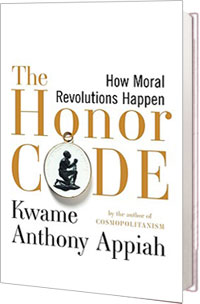Distinguished scholar Kwame Anthony Appiah, in his book The Honor Code: How Moral Revolutions Happen suggests that societies abandon immoral practices such as slavery only when they become ashamed of those practices:
How does moral progress happen? How are societies brought to repudiate immoral customs they have long accepted? In The Honor Code, Kwame Anthony Appiah explores a long-neglected engine of reform. Examining moral revolutions in the past—and campaigns against abhorrent practices today—he shows that appeals to reason, morality, or religion aren’t enough to ring in reform. Practices are eradicated only when they come into conflict with honor.On the other hand, it has been suggested that the idea of honor was very strong in the antebellum South was very strong, albeit a system of beliefs that is hard for us to understand. Northern abolitionists deeply offended southern honor by suggesting that slavery, a system that southerners infused with the ideal of honor, could not imagine living without. For white men in the South, apparently, not having male slaves and being categorized as equal in stature to former slaves was seen as demeaning their manhood, threatening their sacred honor. It has even been suggested that they would go to war rather than let slavery be abolished as a matter of honor.
Recall that dueling occurred in the South up to and during the Civil War. People would fight to the death over what now seem to us to be petty incidents, but in fact to protect and preserve their honor. A man would duel with someone that was likely to seriously wound or kill him rather than let his honor be sullied. Might a community of such men have gone to war with an enemy to whom they were likely to lose rather than see their common honor besmirched? Would southerners have willingly gone to war with the Union rather than accept emancipation, even realizing the significant probability of losing a hard war, because emancipation would threaten their perception of their sacred honor in intolerable fashion, would threaten the perceived basis of their manhood?
If Appiah is right that it is necessary to make people feel that behavior which we feel is immoral offends their honor, is shameful, then it would seem important to do so very carefully.

No comments:
Post a Comment